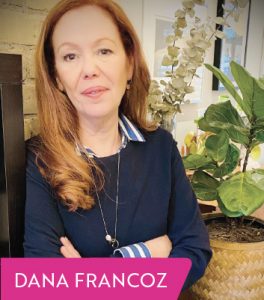 Dana Francoz has had a long career in media representing some of North America’s most iconic brands to Canadian advertisers and marketers, across every media platform – print, digital, broadcast, radio and Out of Home. Throughout her career, Dana has also been a dedicated volunteer and board member. Most recently, Dana was an active member of the board of the Clarendon Foundation, seeing its eventual integration into PACE, which serves people with disabilities, allowing them to live independently.
Dana Francoz has had a long career in media representing some of North America’s most iconic brands to Canadian advertisers and marketers, across every media platform – print, digital, broadcast, radio and Out of Home. Throughout her career, Dana has also been a dedicated volunteer and board member. Most recently, Dana was an active member of the board of the Clarendon Foundation, seeing its eventual integration into PACE, which serves people with disabilities, allowing them to live independently.
Dana grew up with an amazing mother who, although she was in a wheelchair, gave her a real-life example of just how much can be accomplished, no matter what your physical limitations. Her mother, Marjorie Francoz, has been a peer supporter of SCI Ontario for close to 40 years.
QHow did you first get involved with SCIO?
I became involved with SCIO, then CPA, when my mom was at Lyndhurst. I have since supported them in whatever way I could – even competing in the wheelchair relay one year, as one of a team of five who raised $10,000.00.
QWhat drove your engagement in SCIO to the level of wanting to serve on the board?
I have been a volunteer on various Boards over the years. In 2019, my mother was awarded the Governor General’s Sovereign Medal for Volunteers for her long commitment (40+ years) as a Peer Supporter. SCIO held an event to honour her, where I worked closely with the Marketing team and the Peer Support Team. I wanted to contribute more and was thrilled to be invited to join the SCIO Board in June 2019.
QWhat has been the biggest success for SCIO during your tenure?
I think one of our biggest successes was the incredible way in which every member of the SCIO team pulled together to make it through 2020, while maintaining our services and growing Cortree and supporting those in need. Our team, under Stuart’s leadership, has been outstanding!
QWhat has been the most difficult challenge during your tenure?
Fundraising has been such a difficult challenge, though only one of many in this Pandemic year. And yet, back to your last question, our Fundraising team has really gone to the ‘nth degree to deliver some amazing successes between our events – all virtual this year and bringing in new donors.
QWhat advice would you give to someone who was thinking about joining the board or becoming a community member on a board committee?
Our 2021/22 Board slate is fabulous – such a wealth of talent, understanding, knowledge and commitment to Spinal Cord Injury Ontario. This would be a wonderful time to join one of our committees and become a contributing member of our team.

Omar Ha-Redeye is a lawyer and legal educator. He is the Executive Director of the Durham Community Legal Clinic, where he advocates and provides services for low-income and historically marginalized populations and teaches at Ryerson University. He holds a JD from Western and an LLM in Health Law from Osgoode Hall. Prior to becoming a lawyer, he worked in clinical health care.
Omar joined the Board in 2018, and prior to that time served on the SCIO Young Professionals Board since 2015. He is the Chair of the Advocacy Committee of the SCIO Board and is actively involved in SCIO’s government relations and legislative strategies.
QHow did you first get involved with SCIO?
I first got involved with SCIO when a community member invited me to attend an SCIO event. As a lawyer and an advocate, I have long strived to promote an inclusive community, and I was impressed with some of the work SCIO was doing as part of its community. I spoke more with some volunteers who were involved with SCIO, and they convinced me to get more involved and to volunteer myself.
QWhat drove your engagement in SCIO to the level of wanting to serve on the board?
Prior to law, I had been engaged in graduate-level studies in rehabilitation sciences from a front-line healthcare perspective, working with people with a spinal cord injury in the hospital setting. This was before I decided I wanted to move towards the legal industry, but it left a lasting impression on me in terms of the needs of these clients. My own sports injury in 2004, though transitory, illustrated for me directly the accessibility challenges for those with mobility difficulties.
My first formal involvement was on the Young Professionals Board, where we organized some events for SCIO. Seeing the wide variety of people who attended these events in support of SCIO was truly impressive. I then joined the Advocacy Committee, where I was exposed to SCIO’s comprehensive government relations and law reform initiatives. Based on these experiences, I was very keen to get even more involved in the organization and joined the board in 2018.
QWhat What has been the biggest success for SCIO during your tenure?
We have had some incredible successes in raising awareness of the challenges people with spinal cord injuries face among our local politicians, irrespective of their political affiliation. SCIO has held several events directly at Queen’s Park, which have been widely attended by members of the legislature. Board members and members of the SCIO community have an opportunity to directly interact with these political representatives, and I’ve seen first-hand how these exchanges help put a human face on challenges of accessibility and adequate health services.
QWhat has been the most difficult challenge during your tenure?
The COVID-19 pandemic has been difficult for us all, but has been even more difficult for some people in the community who were already struggling with isolation or lack of adequate supports. Organizing committees and board activities during this period has also been more demanding than usual, especially for those of us who have family responsibilities.
Despite this, we’re hopeful that we will all come out of the pandemic with a renewed vigour and eagerness to champion SCIO, and to advocate for individuals with spinal cord injuries.
QWhat advice would you give to someone who was thinking about joining the board or becoming a community member on a board committee?
The SCIO community is a vibrant one that has a significant impact in our society. There are lots of ways to get involved in the organization, and plenty of board and committee members that are willing to find ways for people to be involved. I would encourage anyone who was interested to reach out to SCIO staff, who can help put them in touch with other volunteers, where they can learn more about how to get more deeply involved.






